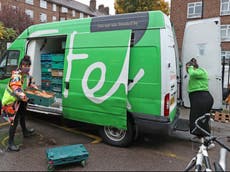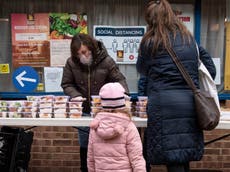Help The Hungry: Middle-class graduates join food bank queues as crisis deepens
Breadth of food poverty crisis has forced well off to depend on charities to get by, David Cohen reports

Your support helps us to tell the story
From reproductive rights to climate change to Big Tech, The Independent is on the ground when the story is developing. Whether it's investigating the financials of Elon Musk's pro-Trump PAC or producing our latest documentary, 'The A Word', which shines a light on the American women fighting for reproductive rights, we know how important it is to parse out the facts from the messaging.
At such a critical moment in US history, we need reporters on the ground. Your donation allows us to keep sending journalists to speak to both sides of the story.
The Independent is trusted by Americans across the entire political spectrum. And unlike many other quality news outlets, we choose not to lock Americans out of our reporting and analysis with paywalls. We believe quality journalism should be available to everyone, paid for by those who can afford it.
Your support makes all the difference.Middle-class graduates are among those queueing for food from charities this winter as the hunger crisis deepens in the pandemic – with one organisation saying members of the typically well-off social group make up around one in 10 of their service users.
At a food bank in north London, George, a masters graduate in politics from Leeds University, tells how he never imagined it would come to this. Twice a week for the last two months, the unemployed 49-year-old has queued up in Bounds Green because he can no longer afford to feed himself.
At first he was hesitant to go. “I thought, there are people more desperate than me,” he said. “I had been looking for work but since Covid hit there are no jobs and my savings dwindled to zero, so I turned to the food bank for help. The food they give me covers me for the week. I’d be in trouble without them.”
George expected to be the only graduate queueing with 150 other people in the cold for a bag of groceries, but he was wrong. “I’ve already met half a dozen people with degrees, including an MBA,” he said.
One of them, Tudy Lewis, a single mother with a bachelor of science degree from University of Westminster, is a nutritionist whose work dried up since the pandemic. Another is Ted, a Cambridge-educated unemployed paramedic who is also a single father and cannot feed his four children — aged two, five, seven and nine — without the food bank. Neither of them had ever before set foot near a food bank and had felt “humiliated and embarrassed” to do so.
Their testimonies reveal that food poverty is cutting a wider and deeper swathe across the country at the end of 2020 than ever before.
Ishraq Bhatti, co-founder of the Bounds Green food bank, said the trend was clear. “It is a new phenomenon but almost 10 per cent of the households we feed are now educated middle class.
“We launched our food bank in May and support 450 households a week, which equates to about 1,200 people, which is five times the numbers we helped when we started.”
Our reporter watched as the queue formed around half an hour before opening time, with people standing in a line that snaked for 100 metres down the side of the church building, across the front and down the other side, shuffling to keep warm.
They included young mothers with babies in prams, who had come to pick up fresh fruit and veg, supplied by The Independent’s Help The Hungry charity partner, The Felix Project.
Ms Lewis, 46, said: “I spent five years studying for a degree. I’m a graduate, I never expected to be standing next to people who have such hard circumstances.
“However, when work dried up, universal credit was not enough and I worried I would be unable to feed my six-year-old son. It was very embarrassing to come here. It felt like everybody must be watching me. But nobody judges. Now I help as a volunteer. It helps me to give back.”
Ted, 58, added: “I have been an ambulance driver for 15 years. I demanded better PPE to protect us but none was forthcoming so I resigned.
“I never thought I’d be a candidate for the food bank but I’ve met all sorts, including former police officers.
“I came today because I don’t have enough food to feed the kids beyond dinner tonight. If it weren’t for these wonderful people, I would have gone out of my mind.”
Anthy Orphanou, the food bank’s day coordinator, said they were seeing lots of people like Ted who never used food bank’s before. “One lady said to me, ‘All these years I’ve donated to food banks and now I am using one’. Every week the queue gets longer. People arrive at 10am to be first in the queue at 2pm. One lady brings her own chair.”
Shaun, 58, a self-employed driver, said: “I’ve worked all my life and never had problems supporting myself, so I find it embarrassing to stand in a queue and worry that one of my neighbours might drive past and see me. Covid has brought me to a tough place.”
Other north London food banks, also supplied by The Felix Project, told The Independent they were seeing a sharp rise in people never dependent on food banks before.
Anna Maughan, vice chairman of Finchley Food Bank, said: “We help 110 households a week, up from 30 prior to Covid. You can see they are hungry. They look like they have lost weight, their skin is hanging a bit. The last thing they want is a handout.”
Helen Shannon, co-founder of North Finchley Food Bank, said: “About 10 per cent of our users are middle class. People are mortified to find themselves in this position. But this is London in 2020.”
This December we will be delivering food directly to 1,000 people a day through our partner With Compassion. Please donate here to help us do all we can to ensure no one goes hungry this Christmas.







Join our commenting forum
Join thought-provoking conversations, follow other Independent readers and see their replies
Comments